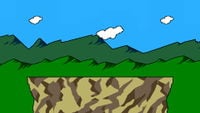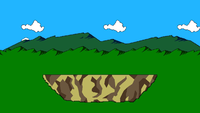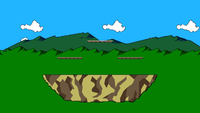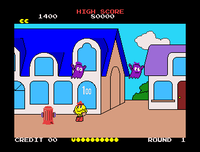Pac-Land
| Pac-Land Pac-Land | |
|---|---|
{{{content1}}}
{{{content2}}}  Pac-Land as it appears in Smash. | |
| Universe | Pac-Man |
| Appears in | SSB4 (Wii U) Ultimate |
| Availability | Unlockable (SSB4) Starter (Ultimate) |
| Unlock criteria | Play all 3 maps in Smash Tour. |
| Crate type | Presents |
| Maximum players | 6 (Wii U) 8 (Wii U Ω form, Ultimate) |
| Article on Wikipedia | Pac-Land |
| “ | This is an auto-scrolling stage where the scene continuously changes. There are also a few hidden features from the original arcade version of PAC-LAND, so try to find them! | ” |
| —Super Smash Blog, Super Smash Bros. Ultimate Official Site | ||
Pac-Land (パックランド, Pac-Land), also stylized PAC-LAND, is a stage in Super Smash Bros. for Wii U and Super Smash Bros. Ultimate. In Ultimate, Pac-Man is fought here for his unlock battle.
Stage overview
Similar to Mushroomy Kingdom from Brawl and 3D Land from the 3DS version, Pac-Land is a side scrolling stage that moves automatically. The scrolling speed is dependent on each player's location: moving ahead will speed it up, while lagging behind will slow it down. The stage follows the layout of the original Pac-Land arcade game, going through three rounds before reaching Fairyland. After this, the stage scrolls back to the left, mimicking Pac-Man's return trip in the original game. After each of the first two rounds, a "Break Time" sign appears, and a point display is shown; this is purely aesthetic, and no high score is kept.
The stage starts at Pac-Man's House, and scrolls through a town where buildings can be used as platforms. Three Fire Hydrants appear in the first section, shooting water that pushes players back. The second section is a forest where players appear as silhouettes behind the trees. Three tree trunks appear as obstacles. Out of the six total hydrant and log obstacles, two are randomly selected to be pushable to the right. If done correctly, the player to do so is rewarded by temporarily growing, akin to touching a Super Mushroom. The third section is a bridge consisting of platforms suspended above water (which players cannot swim in). A model ship can be collected to add extra platforms, and water spouts serve as damaging hazards. The stage then transitions to Fairyland, where the Mother Fairy appears. She spawns a pair of Wing Shoes that reward a player with a temporary boost to jump height.
The stage then begins scrolling right-to-left, signalling the return trip. It starts with tall cacti that serve as obstacles, before moving into a canyon area that features collapsing log bridges. Hitting a certain point spawns a Special Pac item that grants temporary invincibility. After passing by a small lake, the stage returns to the town. Pushing a certain hydrant releases balloons that heal damage when touched. The stage ends at Pac-Man's house, where Ms. Pac-Man can be seen. The cycle then starts over again on a new trip.
Every time a cycle starts, a splash screen displays the number of the current trip. Each cycle takes approximately two minutes and thirty seconds to complete. Unlike the original Pac-Land, the cycles are the same each time, although the color of the sky is dependent on the trip (starting at midday and cycling through evening, night, and morning before returning to day).
Ω forms and Battlefield form
In Super Smash Bros. for Wii U, the Ω form of this stage takes place in the canyon area. Despite having walls and a platform extending below the blast line, wall jumps are impossible here; this is the only stage with this distinction.
In Super Smash Bros Ultimate, the Ω form and Battlefield form are similar to the Ω form in SSB4; however, the main platform does not extend below the blast line and is resized and reshaped to match Final Destination and Battlefield, respectively. The three soft platforms of the Battlefield form are made of pixelated wood and are unique to this form. The characters are still flat, which also flattens the hitboxes and alters gameplay significantly as a result.
Hazards Off
With hazards off in Ultimate, the stage still scrolls, and its speed is still affected by the positions of the fighters. However, several other changes are made to the stage:
- Hydrants will not spit water.
- Although there are still randomly selected hydrants and tree trunks that can be pushed, they will neither increase the size of the player, nor will they spawn balloons on the return trip.
- The model ship does not appear in the bridge section, and the platform it spawns will not appear.
- No water spouts will appear in the bridge section.
- Although the Mother Fairy still spawns the Wing Shoes, they cannot be collected.
- The Super Pac item does not appear on the return trip.
- The log bridges in the canyon do not spin or collapse.
- The cloud platforms in the canyon and above the lake do not move.
- Although the springboard still appears next to the lake, it is nonfunctional.
Origin
The stage is a faithful recreation of the 1984 arcade game Pac-Land, a side-scroller where Pac-Man sets off to return a lost fairy to her home. Starting at his house, Pac-Man goes left-to-right through three areas before reaching Fairyland. In exchange for returning the fairy, he receives a pair of Wing Shoes, which allow him to jump indefinitely. He then travels right-to-left through a fourth area to head home, after which the cycle repeats. Every area except the Castle is featured in this stage. While the original game's levels change as the game progresses, the Pac-Land stage has a predetermined layout that always remains the same. Although the game was based on the Hanna-Barbera Pac-Man cartoon, and appears as such in the version published by Bally Midway (publisher of the Pac-Man titles internationally in the '80s), the level in Smash is primarily based on the Japanese version, which bases its designs for Pac-Man and his family off of artwork from previous arcade cabinets. This game was also the first official installment to feature the more anthropomorphic designs of the Pac-Man characters in-game.
Pac-Land is notable for being one of the first games to use parallax scrolling (where the foreground and background move at different speeds to simulate perspective), long before it became a gaming mainstay in the 16-bit era. This is reflected by the parallax scrolling on the stage.
Pushing a fire hydrant to grow is inspired by the Helmet power-up in the game, which could be obtained the same way. The Special Pac was an item found on the return trip that granted an extra life.
Ms. Pac-Man was a character not created by Namco, but by Midway. She would eventually be owned by Namco years later, although legal troubles would eventually lead to her being used more scarcely, unnamed, or outright replaced by look-alikes in some rereleases of Pac-Man titles that featured her. Pac-Land was the first appearance of the character in Japan.
The setting of Pac-Land reappears in later Pac-Man games, but with different designs. Its most notable modern appearances is in the Pac-Man World games.
Tournament legality
This stage is banned in tournaments, due to the stage containing walk-off blast lines, autoscrolling, no grabbable edges, and sections that require precise platforming, which completely disrupts any form of competitive play.
Glitches
- On the bridge section, there is a lone hydrant on a platform. If Mr. Game & Watch faces the right and jumps on that platform, to the left of the hydrant, he will begin to repeatedly perform a landing animation every other frame.
- If Bellossom is summoned on this stage, its Sleep Powder will move away from Bellossom.
Update history
- Pac-Land's on-screen appearances locations have been changed.
Gallery
Super Smash Bros. for Wii U
Pac-Man's house in Super Smash Bros. for Wii U.
Pac-Man, Toon Link, Yoshi, and Male Wii Fit Trainer in Fairy Land.
Rosalina next to the Fairy Queen.
Super Smash Bros. Ultimate
Names in other languages
Trivia
- If Little Mac hits someone with the KO uppercut on this stage, the screen won't zoom in.
- Despite the camera being fixed by default, setting the camera mode to fixed will cause it to zoom out further, beyond the camera bounds indicated by the radar.
- Despite the stage being based on Pac-Land, no music from the game is featured in either for Wii U or Ultimate. Because of this, Pac-Land is the only stage without any music being from its origin game.
- On this stage, the music will not start until after the countdown has finished, in reference to similar behavior in Pac-Land.
- While the stage start transition and the sprite for Ms. Pac-Man are based on the Japanese version, the building the fighters pass at break time is based on the American version (as the Japanese version depicted a Christian church).
- Pac-Baby (known as Baby Pac-Man at the time), who appears at the end of a trip in the original game, is not featured in the stage as well.
- The following Assist Trophies cannot appear on this stage: Thwomp, Moon, Mother Brain, Nightmare, Andross, Jeff, Black Knight, Kapp'n, Color TV-Game 15, Devil, Dr. Wright, Nikki, Yuri Kozukata, Arcade Bunny, Squid Sisters, Ghosts and Shadow the Hedgehog. Additionally, the following Poké Ball summons cannot appear on this stage: Abra, Alolan Exeggutor, Snorlax, Lugia, Xerneas, Lunala and Marshadow.
|
| |
|---|---|
| Fighter | Pac-Man (SSB4 · SSBU) |
| Assist Trophy | Ghosts |
| Stages | Pac-Maze · Pac-Land |
| Trophies and Spirits | Trophies · Spirits |
| Music | SSB4 · Ultimate |
| Masterpiece | Pac-Man |











